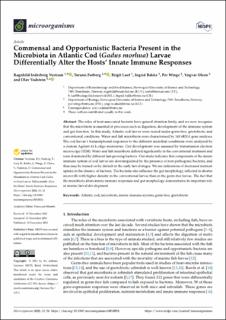| dc.contributor.author | Vestrum, Ragnhild Inderberg | |
| dc.contributor.author | Forberg, Torunn | |
| dc.contributor.author | Luef, Birgit | |
| dc.contributor.author | Bakke, Ingrid | |
| dc.contributor.author | Winge, Per | |
| dc.contributor.author | Olsen, Yngvar | |
| dc.contributor.author | Vadstein, Olav | |
| dc.date.accessioned | 2022-12-01T13:50:52Z | |
| dc.date.available | 2022-12-01T13:50:52Z | |
| dc.date.created | 2022-04-11T09:38:12Z | |
| dc.date.issued | 2022 | |
| dc.identifier.citation | Microorganisms. 2022, 10 (1), . | en_US |
| dc.identifier.issn | 2076-2607 | |
| dc.identifier.uri | https://hdl.handle.net/11250/3035403 | |
| dc.description.abstract | The roles of host-associated bacteria have gained attention lately, and we now recognise that the microbiota is essential in processes such as digestion, development of the immune system and gut function. In this study, Atlantic cod larvae were reared under germ-free, gnotobiotic and conventional conditions. Water and fish microbiota were characterised by 16S rRNA gene analyses. The cod larvae’s transcriptional responses to the different microbial conditions were analysed by a custom Agilent 44 k oligo microarray. Gut development was assessed by transmission electron microscopy (TEM). Water and fish microbiota differed significantly in the conventional treatment and were dominated by different fast-growing bacteria. Our study indicates that components of the innate immune system of cod larvae are downregulated by the presence of non-pathogenic bacteria, and thus may be turned on by default in the early larval stages. We see indications of decreased nutrient uptake in the absence of bacteria. The bacteria also influence the gut morphology, reflected in shorter microvilli with higher density in the conventional larvae than in the germ-free larvae. The fact that the microbiota alters innate immune responses and gut morphology demonstrates its important role in marine larval development. | en_US |
| dc.language.iso | eng | en_US |
| dc.publisher | MDPI | en_US |
| dc.rights | Navngivelse 4.0 Internasjonal | * |
| dc.rights.uri | http://creativecommons.org/licenses/by/4.0/deed.no | * |
| dc.title | Commensal and opportunistic bacteria present in the microbiota in atlantic cod (Gadus morhua) larvae differentially alter the hosts’ innate immune responses | en_US |
| dc.title.alternative | Commensal and opportunistic bacteria present in the microbiota in atlantic cod (Gadus morhua) larvae differentially alter the hosts’ innate immune responses | en_US |
| dc.type | Journal article | en_US |
| dc.type | Peer reviewed | en_US |
| dc.description.version | publishedVersion | en_US |
| dc.source.pagenumber | 0 | en_US |
| dc.source.volume | 10 | en_US |
| dc.source.journal | Microorganisms | en_US |
| dc.source.issue | 1 | en_US |
| dc.identifier.doi | 10.3390/microorganisms10010024 | |
| dc.identifier.cristin | 2016599 | |
| cristin.ispublished | true | |
| cristin.fulltext | original | |
| cristin.qualitycode | 1 | |

